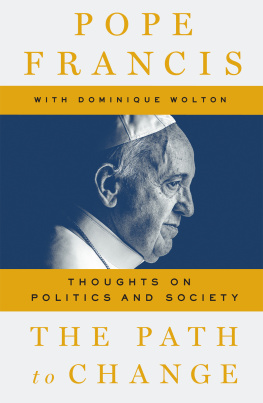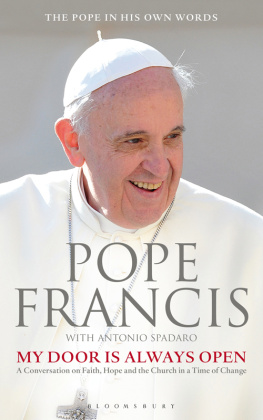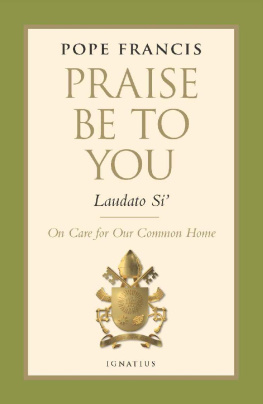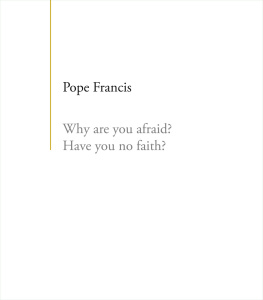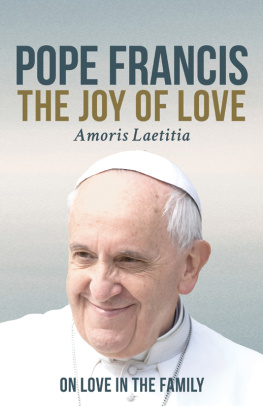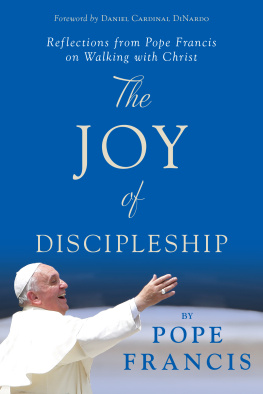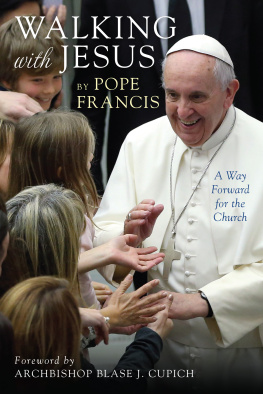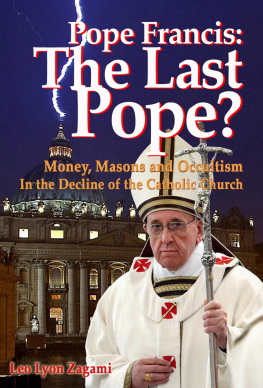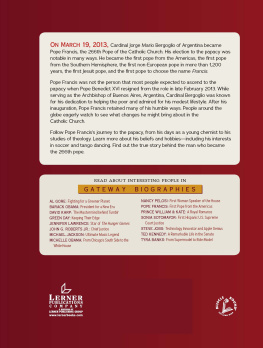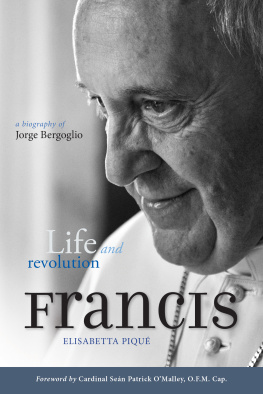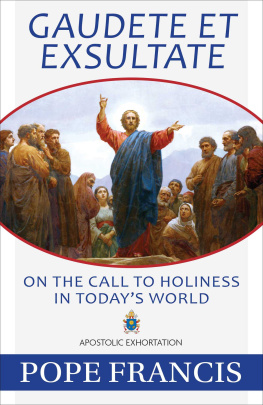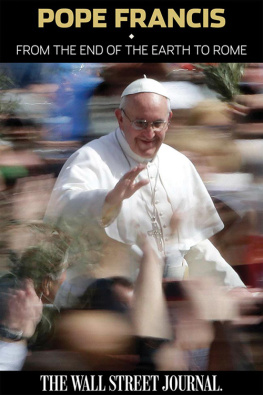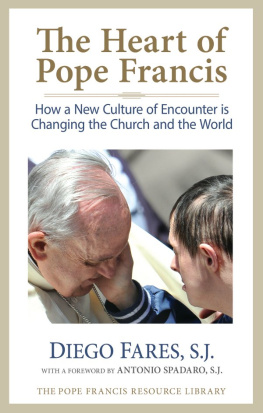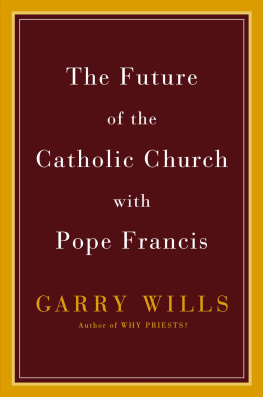CONTENTS
Interview
Extracts from addresses
Address of the Holy Father on the occasion of his meeting with members of the General Assembly of the United Nations Organization,New York, USA, 25 September 2015
Joint declaration made at the meeting between His Holiness Pope Francis and His Holiness Kirill, Patriarch of Moscow and All Russia,Jos Mart International Airport, Havana, Cuba, 12 February 2016
Interview
Extracts from addresses
Address of the Holy Father Pope Francis at the Expo Feria Exhibition Centre, Santa Cruz de la Sierra, Bolivia, 9 July 2015
Address of His Holiness Pope Francis to participants in the Third World Meeting of Popular Movements, Paul VI Audience Hall, The Vatican, 5 November 2016
Interview
Extracts from addresses
Address of His Holiness Pope Francis at the Conferral of the Charlemagne Prize, Sala Regia, The Vatican, 6 May 2016
Address of His Holiness Pope Francis to the Heads of State and Government of the European Union for the Celebration of the Sixtieth Anniversary of the Treaty of Rome, Sala Regia, The Vatican, 24 March 2017
Interview
Extracts from addresses
Pope Francis address to the Italian Council of the Order of Journalists, 400 journalists, in the Clementine Hall, The Vatican,22 September 2016
Address of His Holiness Pope Francis to the newly appointed bishops participating in the formative courses organized by the Congregations for Bishops, Clementine Hall, The Vatican, 16 September 2016
Interview
Extracts from addresses
Address of Pope Francis to the participants in the World Meeting of Popular Movements, Old Synod Hall, The Vatican, 28 October 2014
Address of Pope Francis to participants in the Pilgrimage of the Poor, accompanied by Cardinal Barbarin, Paul VI Audience Hall, The Vatican, 6 July 2016
Interview
Extracts from addresses
Address by the Holy Father at the welcoming ceremony by the young people of WYD on the occasion of the XXXI World Youth Day (2731 July 2016), Jordan Park, Blonia, Krakw, Poland, 28 July 2016
Address by His Holiness Pope Francis at the prayer vigil with young people on the occasion of the XXXI World Youth Day (2731 July 2016), Campus Misericordiae, Krakw, Poland, 30 July 2016
Interview
Extracts from addresses
Address of His Holiness Pope Francis on the occasion of the presentation of the Christmas greetings to the Roman Curia, Clementine Hall, The Vatican, 22 December 2014
Address of His Holiness Pope Francis on the occasion of the presentation of the Christmas greetings to the Roman Curia, Clementine Hall, The Vatican, 22 December 2016
Interview
Extracts from addresses
Address of His Holiness Pope Francis on the occasion of his visit to the United Nations Office at Nairobi (UNON), Kenya, 26 November 2015
Address of His Holiness Pope Francis to the participants in the International Peace Conference, Al-Azhar Conference Centre, Cairo,Egypt, 28 April 2017
I dream of a Europe that is young, still capable of being a mother: a mother who has life because she respects life and offers hope for life. I dream of a Europe that cares for children, that offers fraternal help to the poor and those newcomers seeking acceptance because they have lost everything and need shelter. I dream of a Europe that is attentive to and concerned for the infirm and the elderly, lest they be simply set aside as useless. I dream of a Europe where being a migrant is not a crime but a summons to greater commitment on behalf of the dignity of every human being. I dream of a Europe where young people breathe the pure air of honesty, where they love the beauty of a culture and a simple life undefiled by the insatiable needs of consumerism, where getting married and having children is a responsibility and a great joy, not a problem due to the lack of stable employment. I dream of a Europe of families, with truly effective policies concentrated on faces rather than numbers, on birth rates more than rates of consumption. I dream of a Europe that promotes and protects the rights of everyone, without neglecting its duties towards all. I dream of a Europe of which it will not be said that its commitment to human rights
INTRODUCTION
Not easy...
T HE P ROJECT
There are individual destinies that intersect with history. This is true of Pope Francis, who, coming from Latin America, brings a different identity to the Catholic Church. His personality, his journey, his deeds all question an era dominated by the economy but also by a search for meaning, authenticity and often spiritual values. It is this encounter between one man and history that lies at the heart of our discussions, between a man of the cloth and a French intellectual, a layman, a specialist in communication, who has worked for many years on issues of globalization, cultural diversity and otherness.
Why a dialogue? Because it allows us to open ourselves up to one another, to an argument and to the presence of the reader. Dialogue gives meaning to human communication beyond questions of performance and limits of technology.
The angle I have chosen for this book has a bearing on one of the recurrent questions in the history of the Church: what is the nature of its social and political engagement? How does its approach differ from that of a politician? Questions constantly posed when each reading of the Gospel, each rereading of the Church Fathers and the Popes encyclicals encourages a critical engagement and an action intended for the poor, the downtrodden, the excluded... Those who have stood up for centuries to denounce injustice and inequality have often established a direct connection between the political message and spirituality. The conflicted debate concerning liberation theology is one of the last great examples of this. How to conceive and distinguish the spiritual dimension of the political action of the Church? How far can we go, and where should we not go? The idea is to encourage a reflection on what unites and what separates spirituality and political action. This reflection becomes particularly important at a time when we can clearly observe a return of the spiritual question, and a time when, simultaneously and through the globalization of information, inequality is more visible, increasing the urgency of commitment to action, but sometimes also simplifying arguments and often increasing the desire to reduce everything to a political approach. How can we avoid, in the name of modernity, reducing the critical engagement of the Church to that of a global politician, a close cousin of the UN? The Jesuits, through their history, and Latin America, for the history of the Pope, are shining examples of this debate, of the need to preserve a distinction between these two logics, and the difficulty of doing so.
T HE E NCOUNTER
You dont master an encounter, it assumes a shape of its own. Here, it was free, nonconformist, trusting, full of humour. There was a mutual sympathy. The Pope was very much present, he was listening, modest, inhabited by history, with no illusions about humanity. I met him outside of any institutional context, at his home, but that doesnt fully account for his ability to listen, his freedom and his availability. There was very, very little double talk.

